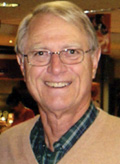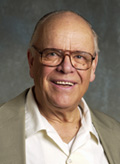The church teaches that all people are gifted by their Creator and called by the Holy Spirit to offer themselves in service as a way of giving thanks for all that God has done and continues to do for us in Jesus Christ. Vocations, occupations, and professions are ways Christians proclaim and bear witness to Christ through loving service in the world. Occupations and callings are not higher or lower, better or worse, more or less connected to God’s work of reconciliation. The plumber’s work can be as much a calling from God and an opportunity to serve as the preacher’s.
Yet, many Christians do not grasp this understanding of their work because as part of their worship, congregations rightly recognize all the ways people serve Christ’s church in the congregation. They may install church boards, publicly thank the choir, and pray for Sunday school teachers, but congregations are often less intentional and explicit about publicly recognizing and honoring daily work as service to God.
In fact, worship may deal with questions of life and death, heaven and hell but never explicitly connect people’s daily work to their faith. This reinforces people’s tendency to separate Sunday from the rest of the week, faith from the rest of life, and Christian service from the way we make our living. Christians may come to regard certain occupations, such as pastor, preacher, nurse, and teacher, as more connected to God’s work and even holier than other occupations. They may understand themselves to be serving God solely by volunteering at church. While this understanding of Christian service might be good for congregations, it suggests that serving God is something people do in addition to everything else they have to do, rather than the reason behind or motivation for everything they do.
I was once the guest preacher at a church in California’s wine country. As part of my visit to the congregation, the pastor and some members of the church took me to a small winery, where a member of the congregation was the vintner. As we toured the winery, he explained the science of winemaking, from growing and harvesting the grapes to fermentation and aging. Then, in the barrel room, we tasted wines at various stages in the process. As I walked around the winery that Saturday afternoon, I found myself thinking about Bible verses and stories that talk about vines, vineyards, and wine. For example, Jesus compares the kingdom of God to a vineyard, turns water into wine, and calls himself the vine and his disciples the branches. Toward the end of our time together, I asked the winemaker what insights he might have about these stories, how growing grapes and making wine might help us understand them and how making wine informed his faith.
After protesting that he knew about grapes and wine and not the Bible and theology, the winemaker spoke of making wine as an experience of God’s grace. Setting aside the exact science and precise calculation he had told us about as we toured the winery, the vintner talked about being totally dependent on God, because in the end making wine is a mystery. God grows the grapes, sends the rain, gives the harvest, and is the power at work in the process of making wine. The winemaker shares in God’s work of creation. “We do our best,” he said. “We offer what we have, and God takes it and does something special.” The next morning in worship, when the ushers brought the communion wine to the altar as part of the offering, we who visited the winery experienced the church bringing what it has to God, who takes it and, in a mysterious way, does something special. We learned this lesson the day before from a winemaker who, when invited to think about it, understood that his job is his Christian vocation.
Worship itself can be a place where God calls and equips the members of Christ’s body for various ministries in the world as people discover their gifts, take on new roles, and gain confidence. “I’m a behind-the-scenes person,” Judy explained to me. “I’m happy to serve on the altar guild, but I don’t want to do anything up front. I won’t assist with communion or read Scripture.” One Sunday we needed someone to help distribute communion and somebody asked Judy. “Just this once,” she said, and then she discovered that she liked doing it. When I asked Judy to visit Anna, a homebound member of the congregation, she told me that she couldn’t do that; she wouldn’t know what to say. Judy did agree to drive me to visit Anna. At first Judy didn’t say much more than hello during those visits, but slowly she started to talk.
After Judy and I visited Anna together for a few months, Judy decided that I wasn’t going often enough and started visiting Anna on her own. When Anna mentioned that she might like to receive communion more than once a month, Judy helped the congregation begin a ministry in which members take communion to the sick and homebound on Sunday after worship. Now Judy works in a senior living center, visiting “complete strangers” and being their advocate with the administration. Judy says that her adventure seems to have begun in worship when someone invited her to step out of her comfort zone and imagine herself in a new way. The love for seniors Judy discovered in church is now the way she serves in the world.
Worship can also be a place where God helps us release responsibilities, leads us to take on different roles, and guides us into new seasons of life. Lee had been a member of the church council for decades, including serving several terms as its president. Lee’s health was failing and his hearing was going. He knew that he could not serve another term as president, and he was having a hard time letting go of the job. “We don’t need you to be president anymore,” the pastor told Lee. “We need you to do something more important.” Lee looked shocked. What could be more important than serving as president of the church council? The pastor continued, “We have kids that want to help out in worship. We need someone to take them under their wing.” We soon found Lee ushering with ten-year-old kids. Lee was their coach and their cheerleader. The congregation could not have planned a better intergenerational activity. No longer a president, Lee had become a mentor, the congregation’s elder statesman, at least as far as the kids were concerned.
When people of faith enter into worship as a place where God uses their different callings, gifts, and abilities the river of God’s reconciling love flows out from the congregation and into the world.
Comment on this article on the Alban Roundtable blog
__________________________________________________________
Adapted from When God Speaks Through Worship: Stories Congregations Live By by Craig A. Satterlee, copyright © 2009 by the Alban Institute. All rights reserved.
__________________________________________________________
FEATURED RESOURCES
 When God Speaks through Worship:
When God Speaks through Worship:
Stories Congregations Live By
by Craig A. Satterlee
When God Speaks through Worship: Stories Congregations Live By is a collection of stories of congregational worship in which God’s ongoing presence, speech, and activity are apparent. These stories of proclaiming the gospel, teaching the faith, praying, singing, baptizing, blessing, and sharing bread and wine in Jesus’s name share the purpose of these activities in worship yet still challenge the reader to explore the motives behind them.
 In God’s Presence:
In God’s Presence:
Encountering, Embracing, and Experiencing the Holy in Worship
by N. Graham Standish
Too many worship services, suggests Graham Standish, are perfunctory, suggesting that most churches don’t think much about how to connect people with God. In God’s Presence makes the case that congregations must restore intentionality and authenticity to worship in a way that will open people to the Holy. Intentionality, he says, reflects a deep understanding of what tradition has attempted to do, what contemporary people are hungry for, what is going on in our culture, and how to connect the three.
 Encounters with the Holy:
Encounters with the Holy:
A Conversational Model for Worship Planning
by Barbara Day Miller
Many churches have active worship committees or planning teams, and an abundance of books and resources guide pastors and laity. Encounters with the Holy offers a conversational model of worship planning that was developed to train practitioners to be more reflective in their planning of worship experiences.
 The Church of All Ages:
The Church of All Ages:
Generations Worshiping Together
Howard Vanderwell, Editor
Among the questions congregations struggle to address are these: Should we try to hold the generations together when we worship? Is it even possible? Led by pastor and resource developer Howard Vanderwell, nine writers—pastors, teachers, worship planners, and others serving in specialized ministries—offer their reflections on issues congregational leaders need to address as they design their worship ministry. They guide readers as they craft ministries and practices that fit their own community, heritage, and history. Each chapter includes questions for reflection and group discussions, and an appendix provides guidelines for small group use.
__________________________________________________________
The Wisdom of the Seasons
Advent Stories in Preaching and Worship
Webinar: Wednesday, October 20, 2010
1:00 pm EDT
Facilitator: Chuck Olsen
Led by Chuck Olsen and based on his latest Alban book, The Wisdom of the Seasons, this webinar will offer practical suggestions on integrating congregational narratives with the church year. Discover how ordinary stories bring us into the timeless wisdom of the rhythms of the seasons—with a seasonal focus on Advent stories in preaching and worship.
__________________________________________________________
New Vision for the Long Pastorate
Seminar: October 19-21, 2010
Federal Way, Washingtong
Facilitator: Ed White
 Come and join others who like you are in the midst of, or facing the prospects of, an extended pastorate. You will have the opportunity to test several proven theories and instruments within the context of your own personal and congregational insights; to review your prospects for growth through either staying in or leaving your pastorate; to examine the support systems needed for a vital longer pastorate, including the critical role of the spouse and family; and to begin the process of outlining your personal and professional goals for upcoming years.
Come and join others who like you are in the midst of, or facing the prospects of, an extended pastorate. You will have the opportunity to test several proven theories and instruments within the context of your own personal and congregational insights; to review your prospects for growth through either staying in or leaving your pastorate; to examine the support systems needed for a vital longer pastorate, including the critical role of the spouse and family; and to begin the process of outlining your personal and professional goals for upcoming years.
__________________________________________________________
